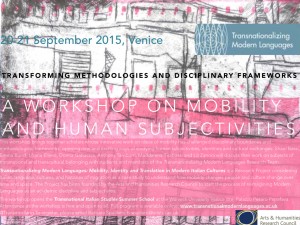Workshop on mobility and human subjectivities – Summer School Transnational Italian Studies -Venice, 20-21 September 2015
07 Jul 2015, by in News Transforming methodologies and disciplinary frameworks. A workshop on mobility and human subjectivities
Transforming methodologies and disciplinary frameworks. A workshop on mobility and human subjectivities
20-21 September 2015
Venue: Palazzo Pesaro-Papafava, Venice
The aim of the workshop is to bring together scholars whose innovative work on ideas of mobility has challenged disciplinary boundaries and methodological frameworks, opening new and exciting ways of furthering the study of human subjectivities, identities and notions of cultural belonging. From different disciplinary backgrounds and proceeding from a range of critical perspectives, each speaker will explore how subjectivity is articulated within transnational spaces where individual and collective identities are constantly shaped and transformed.
The workshop will be organized into three sessions: in each of the three sessions, the speakers will give a talk about their own research and how it addresses the question of subjectivity. The following discussions will be facilitated by members of the project team of Transnationalizing Modern Languages: Mobility, Identity and Translation in Modern Italian Cultures.
Programme:
Welcome: Charles Burdett and Barbara Spadaro
Session One (Sunday 20 September, 4.15-6 pm)
Narrating and consuming Italian-American Identities
Chair: Loredana Polezzi
Speakers: Anthony Tamburri and Elizabeth Zanoni
Session Two (Monday 21 September, 9-11 am)
Memories and Subjectivities in Diasporic Formations
Chair: Derek Duncan, Emma Bond
Speakers: Shaul Bassi, Liliana Ellena
Session Three (Monday 21 September 11.15am – 1.15pm)
Challenging Paradigms in Migration Studies
Chair: Jenny Burns
Speakers: Donna Gabaccia and Maddalena Tirabassi
Attendance at the Workshop is free and open to all. To register, please email Dr. Barbara Spadaro (b.spadaro@bristol.ac.uk)


November 27, 2011I think some background is nracsseey for me because my situation is not what I would think typical; although, of course, I could be wrong.I teach as an adjunct instructor at a north Idaho college. This is a rural area and I teach at two, and via IVC, sometimes three satellite centers. The age of the students ranges from dual-enrollment high school students to students that are 60+. The majority of my students have usually been out of high school for a while, are married or divorced with children, and have returned to school to seek for a better job.I teach Anthropology, Archaeology, Sociology, and English Grammar and Composition. I’ve also taught American Indian Studies. If I could, I would also teach Linguistic Anthropology. I do not separate these various disciplinary approaches to what I teach. I often go off on tangents in all three, or even more areas (I have also worked as a chef and still enjoy the world of food). In terms of subjects/subjectivities, I think that what I really do is teach students to think critically, that is, across disciplines. This is something that really hit the core of my thinking in a year long class in Anthropological Theory.Through the English Division, I receive free booklets and I also read in the texts about thinking critically and reading critically. To me, that means knowing about how to do research, how to read with an open mind, how to find the author’s point or thesis, how to recognize objective research, and how to understand the subjective aspect of all research. To me, when you suggest the term subjectivities, it makes me think of all of the above, and from now on I will talk about how I teach subjectivities, not subjects.I think this is also what students do on the internet. Friends on Facebook hit a person with all kinds of different media, social positions, photos, videos, music, articles, games, tests, etc. Wikipedia can be an endless journey into different tangents of knowledge and thought. A person can google anything, e.g., my husband tries to stump Google with new words which are usually his creation . Books and citations are available to peruse. Students learn so much interactively as you have so well demonstrated. I think this idea of subjectivities also meshes well with the recent work on cognition, e.g., Labov’s research on metaphors and framing, Westin’s focus on neural networks, and so forth. We never think in tunnels. And a single subject sounds like a tunnel. Perhaps that is why social networks sites are so popular, because maybe we think along network lines .Just my thoughts . Thanks for the invite.